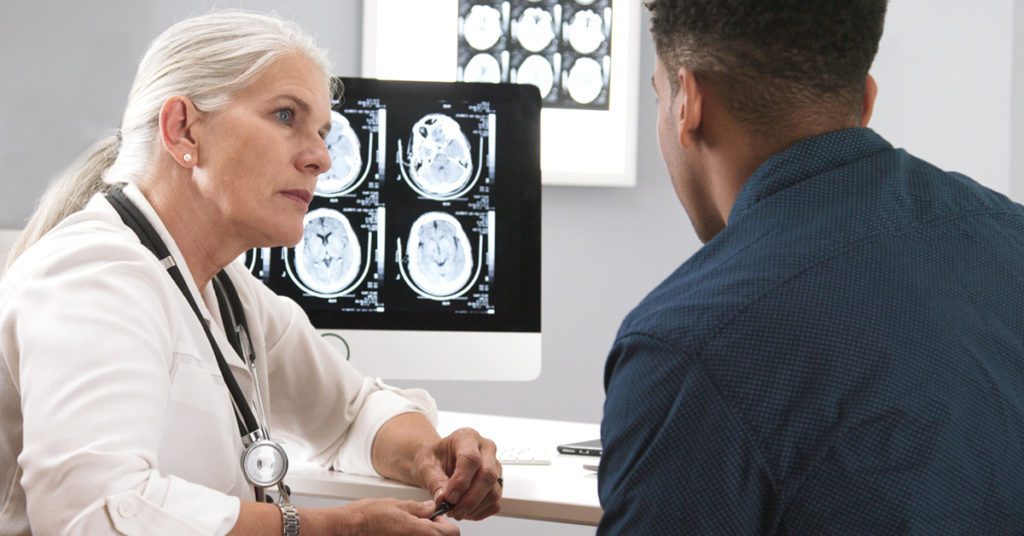How Can Imaging Reveal if You Have a Concussion?
A concussion can happen at any time. This mild traumatic brain injury (TBI) can occur during a fall, because of a car accident or during a contact sport—whenever external trauma impacts the head. When a concussion occurs, your brain bounces or twists within the skull, leading to chemical changes in the brain and damage to the brain cells.
A concussion can often be diagnosed by a doctor after evaluating symptoms such as cognitive problems, balance issues, behavioral changes, and physical issues—including nausea, headaches and vision problems. However, medical imaging studies are standard practice to determine the extent of your injury.
Touchstone Medical Imaging offers a solution to your concussion testing needs. With a doctor referral, advanced imaging studies can be performed quickly—often during a same-day or next-day appointment. Our team of subspecialty trained, neuroradiologists and highly qualified technologists use some of the newest technology and software on the market to provide your doctor with accurate results that he or she can trust to evaluate next steps for your care.
The value of imaging for determining if you have a concussion
Doctors typically order imaging studies to determine the extent and severity of a suspected concussion. If they suspect the presence of a skull fracture or hemorrhage (bleeding in the brain), CT scans are the usually the first choice, due to their speed, accuracy and sensitivity. Traditional MRI scans are often ordered by the doctor if he or she suspects a diffuse axonal injury—a tear in the axon nerve fibers (message conductors in the brain) that often occurs during the concussion.
In addition to CT scans and traditional MRI scans, Touchstone Medical Imaging also offers an advanced form of concussion testing known as diffusion tensor imaging (DTI). DTI, a specialized form of MRI, provides better visualization of water activity in the brain’s white matter than is possible with a traditional MRI. White matter is the connective tracts for the axons within the brain that transmit messages and connect between the gray matter. If water flow is impeded or misdirected in the white matter on the DTI, it’s more likely that there will be symptoms from the concussion. The DTI scan can help determine the extent of the damage.
Concussions and post-concussive syndrome
DTI can also be valuable in diagnosing concussion-related issues that can have a long-term impact on your brain’s health.
Having a first concussion makes you more likely to experience another concussion, and repeated concussions can lead to structural brain injuries, which can cause long-term impairment including anxiety and depression, memory issues and dementia.
Chronic traumatic encephalopathy (CTE), which is most often experienced by athletes who participate in contact sports, domestic violence victims and military personnel, is one such progressive degenerative condition that can develop after repeated concussions. CTE can cause issues that impact behavior, cognitive ability and personality.
Studies have found that a DTI will show differences in the brain of athletes who have recently had a concussion. Abnormalities on a DTI scan can also be a marker of post-concussive syndrome—concussion symptoms that linger long after the injury should have healed—or an ongoing TBI.
Baseline imaging for concussions
If your child plays high contact sports where a concussion is possible, such as football, soccer or baseball, a healthcare professional may perform a preseason baseline test to evaluate brain function, such as problem solving, memory skills and balance. If an injury occurs and a concussion is suspected, a healthcare professional can perform a similar test on the sidelines and compare the results. If different results are identified, more informed decisions can be made.
While a preseason baseline test for cognitive function can be useful on the sidelines, a baseline DTI can provide information that is more accurate than a cognitive assessment. Physicians can more easily determine a post-concussive brain injury when they are able to refer to a baseline image—i.e., an image taken prior to any known concussion.
Using this information, doctors can make educated decisions about when it’s appropriate to return to school and sports.
Touchstone Medical Imaging offers affordable DTI
Medical imaging doesn’t have to be cost prohibitive. At Touchstone Medical Imaging, we offer DTI and other brain MRI at a cost far less than local hospitals. And with locations in Arkansas, Colorado, Florida, Montana, Nebraska, Oklahoma and Texas, there’s bound to be a Touchstone Medical Imaging center convenient for you.
Make an appointment for concussion imaging at a convenient Touchstone Medical Imaging location near you.

